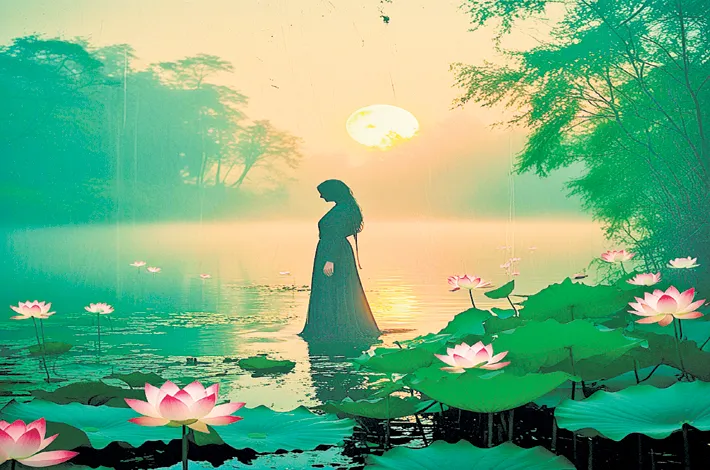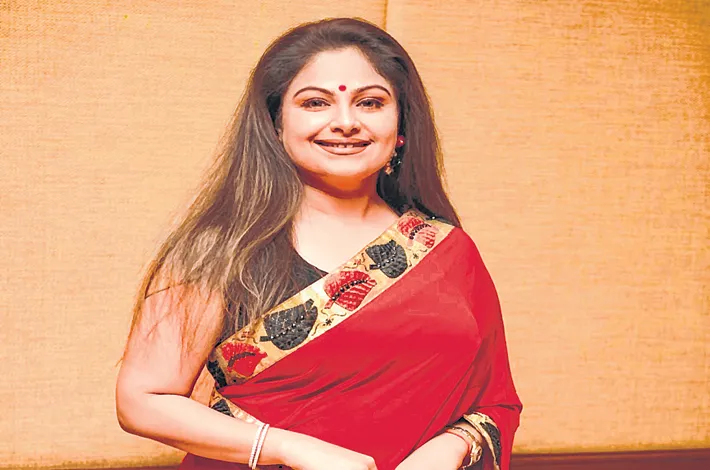Across the Shimmering Veil
11-04-2025 12:00:00 AM

But the lake was not just a bridge; it was a boundary. Meera’s family began to notice her absences, her distracted smiles. Her brother followed her one morning, his shouts echoing across the water as he demanded she return. “Who is he?” he roared when she confessed. “Some stranger from Rajnagar? You’ll ruin us!”
The lake stretched before Meera like a mirror of the sky, its surface trembling with the first light of dawn. She stood at the edge, her dupatta fluttering in the breeze, her eyes tracing the silhouette of the village on the far shore. It was a place she’d only heard of in whispered tales—Rajnagar, a hamlet cradled by hills, where the air carried the scent of wildflowers and secrets. For years, she’d gazed across the water from her own village, wondering about the lives unfolding there. But today was different. Today, she would cross.
Meera’s journey began with a letter, slipped into her hand by a traveling peddler who’d rowed over from Rajnagar. The paper was creased, the ink smudged, but the words burned into her heart: “I see you every morning, standing by the lake. I don’t know your name, but I know your silhouette against the sunrise. Meet me where the lotus blooms.” No signature, no promise—just an invitation that tugged at her restless spirit.
She borrowed her brother’s rickety boat, its oars groaning as she pushed off from the shore. The lake was vast, its depths hiding stories of lovers lost to its currents, but Meera rowed with a quiet courage. Halfway across, the mist thickened, cloaking the world in a silver haze. She paused, her breath catching as a figure emerged on the opposite bank—a man, tall and lean, his kurta catching the wind like a sail.
He was waiting where the lotus flowers bobbed lazily in the shallows. As her boat nudged the shore, he stepped forward, his eyes dark and searching. “You came,” he said, his voice low, as if he hadn’t believed she would.
“I had to,” Meera replied, stepping onto the soft earth. “Who are you?”
“Rohan,” he said, offering a shy smile. “I’ve watched you from here for months. Every morning, you stand there, like a painting I can’t reach.”
Meera felt her cheeks warm. She’d never imagined herself seen, not like that. In her village, she was just Meera—the weaver’s daughter, practical and plain. But in Rohan’s gaze, she was something more.
They sat by the lake, the lotus blossoms swaying between them, and talked as if time could be persuaded to pause. Rohan told her of Rajnagar, its narrow streets and hidden orchards, and how he’d inherited his father’s small bookshop. Meera shared stories of her village, her dreams of seeing the world beyond the lake, and the patterns she wove into her fabrics—threads of hope and longing. The hours slipped away, and when the sun dipped low, casting gold across the water, Rohan reached for her hand.
“Will you come again?” he asked.
She nodded, her heart a tangled knot of joy and fear. “Tomorrow.”
The days that followed became a rhythm of stolen moments. Meera would row across at dawn, her boat slicing through the stillness, and Rohan would be waiting. They explored Rajnagar together—its crumbling temple, its mango groves—and once, he read her poetry from a tattered book, his voice weaving magic into the air. Love crept in quietly, a secret they guarded with glances and half-spoken words.
But the lake was not just a bridge; it was a boundary. Meera’s family began to notice her absences, her distracted smiles. Her brother followed her one morning, his shouts echoing across the water as he demanded she return. “Who is he?” he roared when she confessed. “Some stranger from Rajnagar? You’ll ruin us!”
Rohan, too, faced whispers. His mother, frail and protective, warned him of the divide between their villages—old feuds buried in memory, ready to resurface. “She’s from the other side,” she said. “It’s a dream that can’t last.”
One stormy evening, as thunder rumbled over the hills, Meera didn’t come. Rohan waited by the shore, rain soaking his clothes, until the truth sank in: the lake had become a wall again. Days turned to weeks, and the silence grew heavy. Meera, bound by duty, stopped appearing at the water’s edge. Rohan stopped watching.
Months later, a festival brought the villages together—an uneasy truce marked by lanterns floating on the lake. Meera, draped in a crimson sari, stood among her kin, her eyes scanning the crowd. And there he was—Rohan, his face shadowed but unmistakable. The air crackled as their gazes met, the lake shimmering between them like a promise unbroken.
He crossed first, weaving through the throng, until he stood before her. “I thought I’d lost you,” he whispered.
“You never did,” she said, her voice trembling. “I just didn’t know how to reach you.” The lanterns drifted skyward, and in their glow, Rohan took her hand. The lake, once a divide, now reflected their entwined shadows—a testament to a love that had dared to cross it. Around them, the world held its breath, but for Meera and Rohan, it was only the beginning








